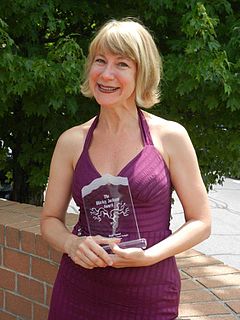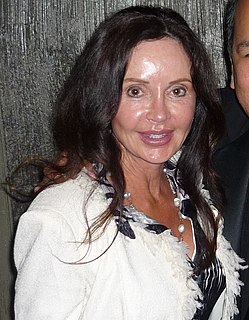A Quote by Lorna Luft
My mother wasn't rational those last years; if she had been, she would have been horrified by her own behavior.
Related Quotes
If she'd spaced her children out and had eleven babies in eleven years, she would have been no better than her own mother and sisters: irresponsible, a welfare cheat, another bit of Sawdust Lane white trash. But as luck would have it, she'd had them all at once, and now she was, overnight, middle-class. And respectable.
As a child, Kate hat once asked her mother how she would know she was in love. Her mother had said she would know she was in love when she would be willing to give up chocolate forever to be with that person for even an hour. Kate, a dedicated and hopeless chocoholic, had decided right then that she would never fall in love. She had been sure that no male was worth such privation.
From an early age she had developed the art of being alone and generally preferred her own company to anyone else’s. She read books at enormous speed and judged them entirely on her ability to remove her from her material surroundings. In almost all the unhappiest days of her life she had been able to escape from her own inner world by living temporarily in someone else’s, and on the two or three occasions that she had been too upset to concentrate she had been desolate.
Sarah Brown is a sweetie to work with. She's a good actress. She's gutsy and she comes in and she knows her lines. She's just terrific. Sometimes I forget how young she is, because she truly walked right in and took the territory and was able to hold her own with people who've been here for so many years. To be able to pull that off [for someone who had never been on a show], I really give the woman a lot of credit. She's done great.
The idea of the book ["The Japanese Lover"] came in a conversation that I had with a friend walking in the streets of New York. We were talking about our mothers, and I was telling her how old my mother was, and she was telling me about her mother. Her mother was Jewish, and she said that she was in a retirement home and that she had had a friend for 40 years that was a Japanese gardener. This person had been very important in my friend's upbringing.
Even after the age of 50 it was impossible for me to see my mother as a human being. I felt she was a monster, and she had subtly been influencing my behavior and my thoughts and my dreams for so long that she was kind of a monster; she was a demon. And when I brought her back to life, I could feel that malevolent presence around me again, that woman who was totally incapable of giving nurturing to anybody, and, you know, her selfishness and her withdrawn indifference to everything but her own needs.
As she had been walking from the ward to that room, she had felt such pure hatred that now she had no more rancor left in her heart. She had finally allowed her negative feelings to surface, feelings that had been repressed for years in her soul. She had actually FELT them, and they were no longer necessary, they could leave.
Hats change everything. September knew this with all her being, deep in the place where she knew her own name, and that her mother would still love her even though she hadn’t waved goodbye. For one day her father had put on a hat with golden things on it and suddenly he hadn’t been her father anymore, he had been a soldier, and he had left. Hats have power. Hats can change you into someone else.
As a child, what I was missing was so much bigger to me than what I had. My mother-mythic, imaginary-was a deity and a superhero and a comfort all at once. If only I'd had her, surely, she would have been the answer to every problem; if only I'd had her , she would have been the cure for everything that ever had gone wrong in my life.
She wasn't ready to settle down, she told her friends. That was one way of putting it. Another was would have been that she had not found anyone to settle down with. There had been several men in her life, but they hadn't been convincing. They'd been somewhat like her table - quickly acquired, brightened up a little, but temporary. The time for that kind of thing was running out, however. She was tired of renting.
Occasionally, on screen, Barbara [Stanwyck] had a wary, watchful quality about her that I've noticed in other people who had bad childhoods; they tend to keep an eye on life because they don't think it can be trusted. After her mother was killed by a streetcar, she had been raised in Brooklyn by her sisters, and from things she said, I believe she had been abused as a child. She had lived an entirely different life than mine, that's for sure, which is one reason I found her so fascinating. I think her early life was one reason she had such authenticity as an actress, and as a person.



































